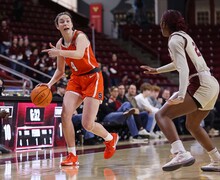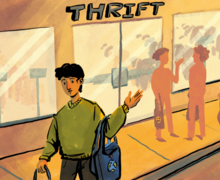Documentary photographer Vincent Cianni shares book portraying LGBT issues in the military
Allen Chiu | Staff Photographer
Photographer and author Vincent Cianni speaks to students about his new book portraying LGBT issues in the military as part of a visiting artist series in the College of Visual and Performing arts.
The back of the book reads: “I am a soldier. I am a gay man. There is no greater honor than to serve in uniform. I can’t tell my name.”
These words speak for and shed light on the lesbian, gay, bisexual and transgender community in the U.S. military, and the eight-year silence it has faced by not being allowed to reveal who they are.
Vincent Cianni, a documentary photographer, shared stories from his yet-to-be released book, “Gays in the Military: How America Thanked Me,” to a group of about 200 people on Tuesday afternoon in Shemin Auditorium in the Shaffer Art Building. The book reveals gay soldiers’ true stories before and after the “don’t ask, don’t tell” policy.
Cianni was invited to speak by Susannah Sayler, an assistant professor in the transmedia department, as the opening lecturer of a visiting artists series for students in the department.
“The goal of this lecture series is to encourage students to consider the role of images and how images can affect social justice,” Sayler said. “They will cross the four disciplines of photography, film, computer arts and video arts, and generally introduce different artistic practices and approaches to students.”
Not only is Cianni a notable artist, but he is also a professor of photography at Parsons The New School for Design. With that background, and the influence from his undergraduate studies in sociology, he uses documentation and photography to pursue human rights issues and social justice.
As Cianni read an essay from his book — in front of an audience for the first time — portraits of soldiers were displayed on the projector. While reading, he often stopped to ask, “What wars are just? What militaries are just?”
“Those photos we take should be about what we are viewing in the world and how we present the world in our own way,” Cianni said.
He said these soldiers chose to join the army and serve their country, yet faced the dangers of torture, beatings and death, just for being gay.
“When I walk into these peoples’ environment and ask them to talk about things that are hard to talk about, I can feel my responsibility for them,” Cianni said.
Cianni then shared his artistic approach to the book and what the final product will ultimately look like. He said he prefers to use black and white photos rather than colored ones because he feels black and white images present reality in a more serious way. Additionally, he said, through photos, people should be able to feel the soldiers’ sorrow, loneliness and invisibility.
He said he hopes that when the book is finished, it will become a kind of historical reference for people to examine in the future.
After Cianni’s speech, he held a short Q-and-A with the audience. Laura Perez, a freshman in the College of Visual and Performing Arts, asked Cianni what made him want to share the secret stories of gay soldiers with the public. Cianni responded that a feeling of responsibility called him to take action, to attract people’s attention and to try to push social changes through images and voices.
To help people understand his message in “Gays in the Military: How America Thanked Me,” Cianni separated the visual narrative of his work from the book’s text. This is unlike his first published book, “We Skate Hardcore,” in which he overlaid text on the photos. He said most of the text in the new book will be transcribed interviews to support the images.
Said Cianni: “It will be easier to bring viewers into the isolated environment of gay soldiers this way.”
Published on September 11, 2013 at 1:13 am
Contact Yang: ybai08@syr.edu





